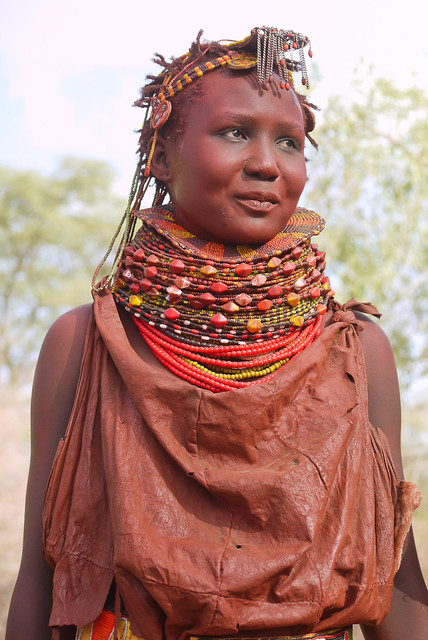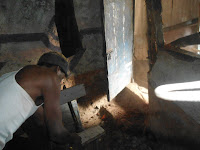 Over Easter long weekend, my friend Charlene and I took a grils' trip to Lake Turkana in Northern Kenya bordering Ethiopia and Uganda. It is the Northern-most lake in the Rift Valley, and was the set for the movie The Constant Gardener. Turkana is remote and almost completely undeveloped. Many Nairobians I know don't even consider it part of Kenya! This area is populated by the Turkana people, who are semi-nomadic pastoralists related to the Massais in the South.
Over Easter long weekend, my friend Charlene and I took a grils' trip to Lake Turkana in Northern Kenya bordering Ethiopia and Uganda. It is the Northern-most lake in the Rift Valley, and was the set for the movie The Constant Gardener. Turkana is remote and almost completely undeveloped. Many Nairobians I know don't even consider it part of Kenya! This area is populated by the Turkana people, who are semi-nomadic pastoralists related to the Massais in the South. 
Getting to Turkana was quite the journey. We took Fly 540 (a regional airline) to Lodwar via Kitale. It's a relatively short flight, each lag was about 1 hour. However, when we landed in Kitale for the stopover, the plane's tire burst. On one hand, I felt very fortunate that we landed safely since we're talking about an airstrip in the middle of nowhere. On the other hand, we know what we'll have to deal with next. As expected, there was no spare tire on the plane OR at the airport. There was also not an engineer/mechanic on the ground, so even if we had a spare tire, nothing can be fixed. So, they had to send a spare tire on the next flight from Nairobi to Kitale along with the engineer. And since it will be dark by the time the spare tire arrives and we won't be able to take off to go to Lodwar, we all need to spend the night in Kitale.
The great thing about hick ups like this while traveling is that you become instant friends with other passenger over your shared misery. We met a few others who incidentally was traveling to the same camp site in Turkana as we. Knowing how absent minded people can be here, we created a buddy system with 2 American girls who were Peace Corp volunteers here, sure that this way, no one will be left behind the next morning when we need to rush out of Kitale en route to Lodwar. Surely enough, the next morning when we got on the van to go back to the airport, the girls weren't there. The van was running a couple shifts to take all the passenger, and we were pretty sure they weren't on the first shift. So, being good "buddies", we held up the van and wanted to find the girls before we leave.
The way people problem solve in Africa is very fascinating to me. Firstly, when a problem arise, even if it's a simple issue that one person can fix in 10 minutes, you will certainly find 3+ people attending to the issue. The first person is the one who is facing/solving the problem, the second person is there to "consult", and the third person to observe/monitor. So imagine 3 people trying to correct a simple mistake on a hotel bill...a simple algebraic problem with the help of a calculator surely can't be too difficult. However, because now 3 people are involved and they'll need to discuss and all, a normally 10 minute process can easily take half an hour or more. The second interesting thing about African problem solving method is an extensive repetition of the problem as though if you repeatedly talk about the problem for enough times, the solution to the priblem will magically appear OR the problem will just go away. So, going back to Kitale, as Charlene and I sat in the van, telling the driver that our friends are not here yet and they should call their hotel room #410 to make sure they come to the van, one of the Kenyan passenger asked, "your friend is not here"..."yes, that's what we said, they are not here, they are in room 410, someone is calling them". Another Kenyan said "they didn't come?" ... "no, they have not come"..."which room are they?" ... "410"...A third person, "what room?"..."410"..."you have called them?"..."no, that's why we asked someone to call them"..."they haven't come?"..."no, they have not..."..."they didn't go with the first van?"..."no, they have not..."..."maybe they left already!"..."no, they were NOT on the first van"..."what room are they in?"..."410"..."I think they left already"..."No, we are sure they weren't on the first van"..."are you sure?"..."yes, we are sure"..."they are not in their room?"... well, this goes on, and you get the idea. Finally, we found out that although the girls did not go with the first van, they did leave with someone else to the airport, so we went on our merry way to the Kitale airstrip right about the time the sun is rising, shining its gentle light on us. Beautiful morning, with the added bonus of this hilarious problem-solving dialogue to set off a good day.
Thankfully, our plane was fixed overnight, and we were on our way to Lodwar. We stayed at Eliye Springs Camp, and they sent someone to pick us. The 1.5 hour journey from Lodwar to Eliye Springs Camp was surreal. We drove through deserts, camels, giant termite hills with very very little amount of settlement. Looking out of the car, the wilderness stretches as far as you can see, there was absolutely no development. The area is completely off-grid, and getting food/water to the area is extremely difficult and expensive. Once we arrived at the camp, we were greeted with icy cold towels and a refreshing herbal drink. The landscape by the lake was not like anything I've seen before. Lake Turkana is huge so it feels a bit like an ocean, the sand beach is lined with palm trees, and the climate was dry and hot. It felt like a hybrid of sand dune and tropical beach with beautiful blue water and wildlife around.
One day we took a boat trip to Central Island National Park, which hosts a few crater lakes given the volcanoes around this area. It was an easy hike, and the landscape was absolutely breathe-taking. We were the only ones on the island, and it felt like we could be on the set of LOST.
The most memorable events during this trip was meeting some incredible individuals who have done incredibly adventurous and brave things in Kenya. The Swiss owner Ralph, for example, was telling us about his challenge trying to develop tourism in Lake Turkana. A biologist by training, Ralph first began organizing research safari in the 70's. He eventually fell in love with Kenya and got into the safari business. Then he got disenchanted with the safari industry as the tourists' focus of taking a safari gradually shift from the journey/adventure to the destination itself. So he began building camp sites and got more into development work. Up until this point, his story isn't all that uncommon; however, he began telling us the challenges he's had building/maintaining Eliye Spring Camp, and those stories sounded like they were from a Hollywood movie.
I couldn't help but wonder...are there people who are more deserving of aids than other? Who has the right to judge which group is worthy of aid and which group isn't? Can we really blame people for their ignorance and desperation? People do desperate things in desperate situations. I guess I haven't been in the development space for very long that I still have a lot of optimism in me. So I believe that there's a time and a place for everything. Maybe it's not Turkana's time yet...it may just be too much too soon right now. Maybe the towns around it needs to be more developed first so that the Turkana people can be exposed to the impact of development little by little so that when development project do come, they can see their value and appreciate the positive impact they can bring to their community. Give it a bit of time, maybe the impact of development will work its way to Turkana like the ripple when you drop a stone into a lake?
No matter what, it's undeniable there are A LOT that can be done here. I asked Ralph, despite of all the hardships and challenges, why is he still in Kenya? What keeps him inspired to stay here vs. moving back to Switzerland? He said, "Switzerland is boring, everything is "done", here in Kenya, nothing is done, you can do so much and make an impact". That really struck a chord with me. For me, the "opportunities" of what more can be done in Africa (or developing countries in general) truly gets me out of bed every morning. I don't feel like just another replaceable paper pusher in a giant money-making machine. Even if I'm in the office, I'm actively doing something that I know will make a significant difference to the company that I'm working for, and to the community that I'm trying to impact. I suppose the thrill of making one's mark in this world can be a bit addicting.
So what's next for Turkana? Oil is recently discovered in Lake Turkana, apparently it's everywhere! If one look at the history of what oil has done for African country, it hasn't exactly gotten a good track record, and has been more of a curse than a blessing. If properly managed, this could be a significant opportunity for the region to get some revenue and build infrastructure (i.e. roads, schools, clinics) that could jumpstart the entire population into a better future. However, with a government where politician do not think twice about selling out his country for personal financial gains and a country where illiteracy and lack of empowerment is so prevalent that the people do not DEMAND justice, I'm more apprehensive than happy about Turkana's future with this oil news. The awe-inspiring, out of this world landscape and beautiful wildlife make Turkana the definition of paradise for me. It would be so sad to see it turn into another Niger Delta with the big oil companies exploiting the poor and natural resources. I pray that will never happen, and enough people in bilateral and civil organizations will garner enough voice to protect this paradise and make the best use of the resource it provides. I sincerely hope that when I return to Turkana in 10 years, it can still remain the beautiful paradise that it is today.
Leaving Lodwar airstrip: this is the ticket counter, security screening, and baggage claim


















